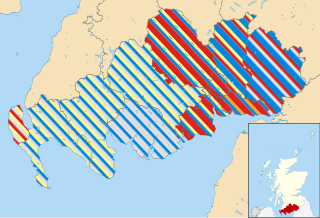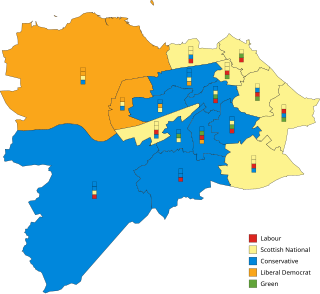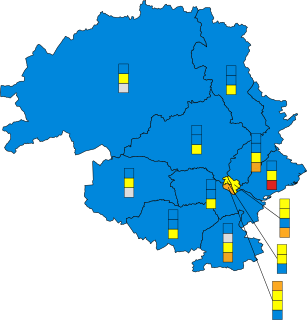| |||||||||||||||||||||||||||||||||||||||||||||||||||||||||||||
All 43 seats to Dumfries and Galloway Council 22 seats needed for a majority | |||||||||||||||||||||||||||||||||||||||||||||||||||||||||||||
| |||||||||||||||||||||||||||||||||||||||||||||||||||||||||||||
The 12 multi-member wards | |||||||||||||||||||||||||||||||||||||||||||||||||||||||||||||
| |||||||||||||||||||||||||||||||||||||||||||||||||||||||||||||
The 2017 Dumfries and Galloway Council election took place on 4 May 2017 to elect members of Dumfries and Galloway Council. The election used the twelve wards created as a result of the Local Governance (Scotland) Act 2004, with each ward electing three or four councillors using the single transferable vote system a form of proportional representation, with 43 councillors being elected, a reduction of 4 members and 1 ward since 2012.

The Local Governance (Scotland) Act 2004 is an Act of the Scottish Parliament which provided, amongst other things, for the election of councillors to the local authorities in Scotland by the single transferable vote system.
The single transferable vote (STV) is a voting system designed to achieve proportional representation through ranked voting in multi-seat organizations or constituencies. Under STV, an elector (voter) has a single vote that is initially allocated to their most preferred candidate. Votes are totalled and a quota derived. If their candidate achieves quota, he/she is elected and in some STV systems any surplus vote is transferred to other candidates in proportion to the voters' stated preferences. If more candidates than seats remain, the bottom candidate is eliminated with his/her votes being transferred to other candidates as determined by the voters' stated preferences. These elections and eliminations, and vote transfers if applicable, continue until there are only as many candidates as there are unfilled seats. The specific method of transferring votes varies in different systems.
Proportional representation (PR) characterizes electoral systems in which divisions in an electorate are reflected proportionately in the elected body. If n% of the electorate support a particular political party, then roughly n% of seats will be won by that party. The essence of such systems is that all votes contribute to the result - not just a plurality, or a bare majority. The most prevalent forms of proportional representation all require the use of multiple-member voting districts, as it is not possible to fill a single seat in a proportional manner. In fact, the implementations of PR that achieve the highest levels of proportionality tend to include districts with large numbers of seats.
Contents
- Election result
- Ward results
- Stranraer and the Rhins
- Mid Galloway and Wigtown West
- Dee and Glenkens
- Castle Douglas and Crocketford
- Abbey
- North West Dumfries
- Mid and Upper Nithsdale
- Lochar
- Nith
- Annandale South
- Annandale North
- Annandale East and Eskdale
- References
Following the election the Conservative Party became the largest party, with Labour falling from first place into third place in terms of votes and seats. The SNP also drew with Labour in terms of seats as they both won 11 seats.
This election also saw Independent councillors Willie Scobie and Jane Maitland returned, but saw Marion McCutcheon, George Prentice, Tom McAughtrie, Yen Hongmei Jin, Denis Male and Craig Peacock all losing their seats. Elaine Murray, the former MSP for Dumfriesshire was elected to the Council in the Nith ward.

Elaine Kildare Murray is a Scottish Labour politician, Leader of Dumfries & Galloway Council and former Member of the Scottish Parliament for Dumfriesshire since 1999. At the 1999, 2003 and 2007 elections, Murray increased her percentage share of the vote. She was Shadow Minister for the Environment in the Scottish Parliament. She lost her seat in 2016.

Dumfriesshire is a constituency of the Scottish Parliament (Holyrood). It elects one Member of the Scottish Parliament (MSP) by the plurality method of election. It is also one of nine constituencies in the South of Scotland electoral region, which elects seven additional members, in addition to nine constituency MSPs, to produce a form of proportional representation for the region as a whole.
Following the election, Ian Carruthers (Annandale South) was elected as the Conservative group leader, Rob Davidson (Abbey) as the SNP group leader and Elaine Murray (Nith) as the Labour group leader. Richard Brodie (Annandale South), is the sole Liberal Democrat councillor.
On 23 May, almost three weeks following the election, Labour and the SNP formed a coalition to form a majority council with Elaine Murray as council leader and Rob Davidson as depute leader and civic head. Although the Conservatives were elected the largest party with 16 seats, they remain in opposition.











